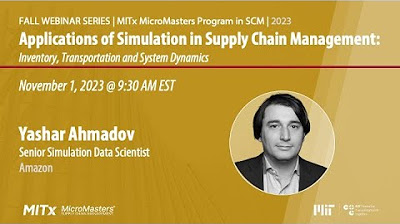MIT Supply Chain Management Master's Program Information Session with Student Panel
Summary
TLDR在这次网络研讨会中,主持人Robert Cummings介绍了麻省理工学院(MIT)供应链管理(SCM)项目的两个学习路径:住宅项目和混合项目。住宅项目是针对有2到5年工作经验的早期职业人士,提供10个月的校园体验,包括定制职业发展和招聘机会,以及为国际学生提供的OPT和STEM工作授权延期。混合项目则是为那些在职业或学术生涯中更为成熟的非传统学生设计的,结合了MITx MicroMasters在线课程和在MIT的一个学期实地学习。学生们分享了他们选择MIT的原因,包括对供应链领域的热情、项目时长的吸引力、以及与Sloan管理学院和工程学院的紧密联系。他们还讨论了在MIT的学习如何影响他们的职业展望,以及他们如何利用MIT的资源和网络来探索不同的职业道路。此外,学生们还提供了对潜在申请者的建议,包括尽早开始准备、利用所有可用资源,并强调了在申请过程中寻求帮助的重要性。
Takeaways
- 🎓 麻省理工学院(MIT)供应链管理(SCM)项目提供两种学习路径:住宅项目和混合项目,分别针对早期职业专业人士和非传统学生。
- 📚 住宅项目为期10个月,提供校园体验,专为有2到5年工作经验的人士设计,注重专业培训和职业发展。
- 🌐 混合项目结合了在线MITx MicroMasters课程和MIT校园学习,为期5个月,为职业中期或非传统学生提供灵活性。
- 📈 学生可以选择论文或顶点项目,前者更偏研究,后者结合研究和实践,与公司合作解决实际问题。
- 👩💼 国际学生可以通过住宅项目获得OPT和STEM延期工作授权,有助于在美国继续职业发展。
- 🔍 项目强调研究资源和职业前景,学生可以与MIT的研究伙伴中心合作,进行为期三周的研究项目。
- 🚀 学生可以通过MIT的资源探索跨学科学习,如核聚变研究,以及参加Sloan管理学院和其他MIT项目的课程。
- 🤝 强调建立职业网络的重要性,包括与校友、行业专家和同学的互动。
- 📈 强调供应链管理技能的市场价值,特别是在全球贸易和疫情背景下。
- 📚 项目内容灵活,根据行业趋势不断更新课程,如新增PowerBI和机器学习等工具和技术。
- ⏰ 申请者应提前准备,包括GMAT或GRE考试,以及构建强大的推荐信网络。
- 📝 申请过程中,个人陈述视频和简历的清晰性对于录取委员会非常重要。
Q & A
罗伯特·卡明斯在这次网络研讨会中扮演了什么角色?
-罗伯特·卡明斯在这次网络研讨会中担任了主持人的角色,他负责引导整个讨论流程,介绍参与的学生嘉宾,并回答观众的问题。
MIT供应链管理(SCM)项目提供哪两种学习路径?
-MIT供应链管理(SCM)项目提供了两种学习路径:一种是住宅项目,为期10个月的校园体验,针对早期职业专业人士;另一种是混合项目,为非传统学生设计的更短的替代项目,结合了在线MITx MicroMasters课程和MIT校园的一个学期学习。
住宅项目和混合项目的课程时间表有何不同?
-住宅项目的入学时间从3月到7月,8月开始有为期10个月的紧凑课程,包括秋季和春季学期的面对面课程,以及1月份的IAP合作期。而混合项目则允许学生以自己的节奏完成在线MicroMasters课程,通常在12到18个月内完成,之后在1月远程进行前期工作,然后加入校园项目。
学生如何通过参与MIT的SCM项目获得职业发展?
-学生可以通过定制的职业发展、专门的招聘机会、与欧洲、亚洲、拉丁美洲的SCALE合作中心的合作,以及在春季进行的体验性学习检查来获得职业发展。此外,国际学生还可以获得OPT和STEM延期工作授权。
学生在完成MIT SCM项目后将获得哪种学位?
-完成MIT SCM项目后,无论是混合项目还是住宅项目,学生将获得相同的MIT学位,即应用科学硕士学位,专业是供应链管理,对于希望进行更深入研究的学生,则可能是更高级的工程硕士学位。
为什么学生选择在MIT攻读供应链管理硕士学位?
-学生们被吸引到MIT攻读供应链管理硕士学位的原因包括:MIT在该领域的学术声誉和研究成就、与行业紧密结合的实用课程、为期一年的紧凑课程、以及能够与来自世界各地的顶尖学者和同学建立联系的机会。
学生在加入MIT SCM项目之前应该做哪些准备?
-学生在加入MIT SCM项目之前应该考虑提前准备GMAT或GRE考试,进行深入的研究和项目探索,以及可能的话,完成MicroMasters课程以更好地适应项目的学习节奏和内容。
MIT SCM项目的课程是如何结合实践和研究的?
-MIT SCM项目提供住宅和混合两种路径,学生可以选择进行论文研究或者与公司合作的顶点项目,这允许学生在进行学术研究的同时,也能够将研究成果应用于实际问题中。
学生在MIT期间有哪些研究资源可以使用?
-学生在MIT期间可以使用的研究资源包括专门的研究导师、公司赞助商和顾问的远程合作,以及与全球各地的学生一起参与的SCALE Connect项目,这些都为学生的研究项目提供了丰富的支持。
完成MIT SCM项目后,学生的就业前景如何?
-完成MIT SCM项目后,学生的就业前景广阔,他们可以进入咨询、技术、医疗保健、可持续性角色等不同行业,或者返回他们之前的雇主那里,利用他们新获得的视角和技能。
学生在MIT期间有哪些非学术活动或机会可以探索?
-在MIT期间,学生可以探索包括斯隆管理学院在内的校园内的各种活动和机会,如创业竞赛、与其他学科的学生合作的项目、以及利用学生身份享受的各种折扣和优惠。
MIT SCM项目如何适应行业变化并引入新的趋势和技术?
-MIT SCM项目通过引入新的工具和方法,如PowerBI可视化工具、机器学习元素和Python编程,来适应行业变化。项目还会向校友了解过去25年中最有价值的技能和未来的发展趋势,以确保课程内容的前瞻性和实用性。
Outlines

Этот раздел доступен только подписчикам платных тарифов. Пожалуйста, перейдите на платный тариф для доступа.
Перейти на платный тарифMindmap

Этот раздел доступен только подписчикам платных тарифов. Пожалуйста, перейдите на платный тариф для доступа.
Перейти на платный тарифKeywords

Этот раздел доступен только подписчикам платных тарифов. Пожалуйста, перейдите на платный тариф для доступа.
Перейти на платный тарифHighlights

Этот раздел доступен только подписчикам платных тарифов. Пожалуйста, перейдите на платный тариф для доступа.
Перейти на платный тарифTranscripts

Этот раздел доступен только подписчикам платных тарифов. Пожалуйста, перейдите на платный тариф для доступа.
Перейти на платный тарифПосмотреть больше похожих видео

Leveraging supply chain optimization and visibility to achieve carbon reduction targets

Global Supply Chains: How Did All This Stuff Get Here?

AI-Driven Supply Chains: 3 Cases | MIT SCALE Webinar | Spanish

AI-Driven Supply Chains: 3 Cases | MIT SCALE Webinar | English

Supply Chain Management as a Partner with Finance

Applications of Simulation in Supply Chain Management
5.0 / 5 (0 votes)
